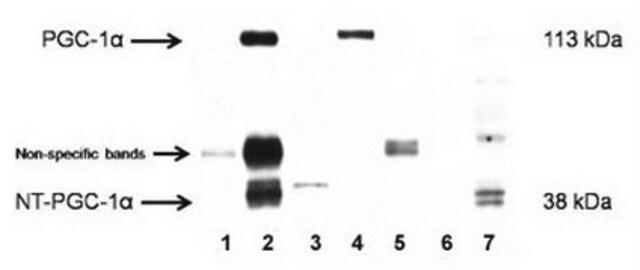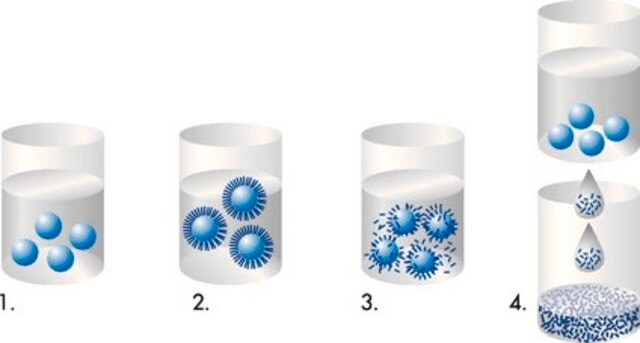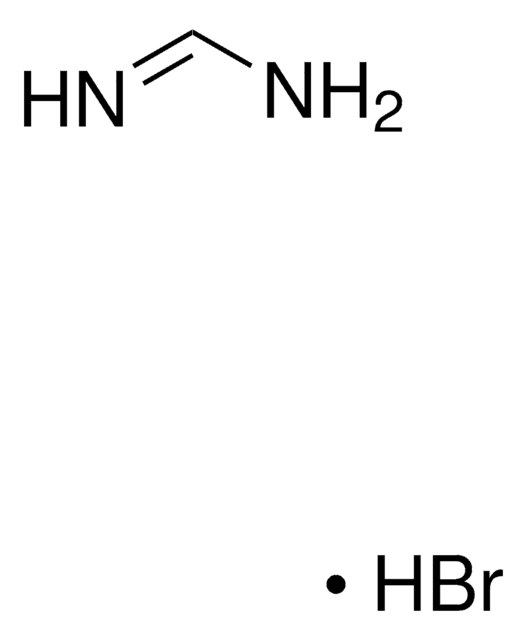07-1208
Anti-Gβ5 Antibody
Upstate®, from rabbit
Iniciar sesiónpara Ver la Fijación de precios por contrato y de la organización
Seleccione un Tamaño
Seleccione un Tamaño
Cambiar Vistas
About This Item
UNSPSC Code:
12352203
eCl@ss:
32160702
NACRES:
NA.41
Productos recomendados
biological source
rabbit
Quality Level
antibody form
purified immunoglobulin
antibody product type
primary antibodies
clone
polyclonal
species reactivity
mouse, rat, human
manufacturer/tradename
Upstate®
technique(s)
western blot: suitable
isotype
IgG
NCBI accession no.
General description
The Gβ5 (GNB5 guanine nucleotide binding protein (G protein), beta 5) is a G protein subunit present predominantly in the central nervous system. This protein appears to be expressed in two forms, one found in the brain of 39 kDa and one found in the retina of 44 kDa. It has also been found that Gβ5 associates tightly with RGS7, a member of the superfamily of negative regulators of G protein signaling. These complexes have been localized to most regions of the brain, whereas G1-4 exhibit no observable colocalization with RGS7, despite their widespread codistribution throughout similar neuronal networks. This antibody is specific for a peptide sequence within the D1 blade which is not found in Gβ1-4.
Specificity
Recognizes D1 area of Gβ5.
Immunogen
Epitope: D1
Unique peptide sequence derived from the D1 blade of the Gβ5 protein.
Application
Optimal working dilutions must be determined by end user.
Research Category
Signaling
Signaling
Research Sub Category
GPCR, cAMP/cGMP & Calcium Signaling
GPCR, cAMP/cGMP & Calcium Signaling
This Anti-Gβ5 Antibody is validated for use in WB for the detection of Gβ5.
Quality
Routinely evaluated by Western Blot on L6 lysates.
Western Blot Analysis: 1:500 dilution of this lot detected G protein Gbeta5 on 10 μg of L6 lysates.
Western Blot Analysis: 1:500 dilution of this lot detected G protein Gbeta5 on 10 μg of L6 lysates.
Target description
This protein appears to be expressed in two forms, one found in the brain of 39 kDa and one found in the retina of 44 kDa
Linkage
Replaces: AB4068
Physical form
Format: Purified
Purified
Purified rabbit polyclonal IgG in phosphate buffered saline with 0.08% sodium azide.
Storage and Stability
Maintain at -20°C in undiluted aliquots for up to 12 months from date of receipt.
Handling Recommendations: Upon first thaw, and prior to removing the cap, centrifuge the vial and gently mix the solution. Aliquot into microcentrifuge tubes and store at -20°C. Avoid repeated freeze/thaw cycles, which may damage IgG and affect product performance.
Handling Recommendations: Upon first thaw, and prior to removing the cap, centrifuge the vial and gently mix the solution. Aliquot into microcentrifuge tubes and store at -20°C. Avoid repeated freeze/thaw cycles, which may damage IgG and affect product performance.
Analysis Note
Control
L6 Cell Lysate, plasma membranes from rat cerebrum.
L6 Cell Lysate, plasma membranes from rat cerebrum.
Other Notes
Concentration: Please refer to the Certificate of Analysis for the lot-specific concentration.
Legal Information
UPSTATE is a registered trademark of Merck KGaA, Darmstadt, Germany
Disclaimer
Unless otherwise stated in our catalog or other company documentation accompanying the product(s), our products are intended for research use only and are not to be used for any other purpose, which includes but is not limited to, unauthorized commercial uses, in vitro diagnostic uses, ex vivo or in vivo therapeutic uses or any type of consumption or application to humans or animals.
¿No encuentra el producto adecuado?
Pruebe nuestro Herramienta de selección de productos.
Storage Class
10 - Combustible liquids
wgk_germany
WGK 2
flash_point_f
Not applicable
flash_point_c
Not applicable
Certificados de análisis (COA)
Busque Certificados de análisis (COA) introduciendo el número de lote del producto. Los números de lote se encuentran en la etiqueta del producto después de las palabras «Lot» o «Batch»
¿Ya tiene este producto?
Encuentre la documentación para los productos que ha comprado recientemente en la Biblioteca de documentos.
Nuestro equipo de científicos tiene experiencia en todas las áreas de investigación: Ciencias de la vida, Ciencia de los materiales, Síntesis química, Cromatografía, Analítica y muchas otras.
Póngase en contacto con el Servicio técnico








